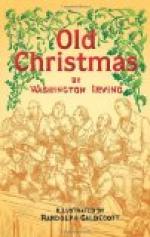I could not help smiling at this display of small erudition on so whimsical a subject; but I found that the peacocks were birds of some consequence at the Hall, for Frank Bracebridge informed me that they were great favourites with his father, who was extremely careful to keep up the breed; partly because they belonged to chivalry, and were in great request at the stately banquets of the olden time; and partly because they had a pomp and magnificence about them, highly becoming an old family mansion. Nothing, he was accustomed to say, had an air of greater state and dignity than a peacock perched upon an antique stone balustrade.
Master Simon had now to hurry off, having an appointment at the parish church with the village choristers, who were to perform some music of his selection. There was something extremely agreeable in the cheerful flow of animal spirits of the little man; and I confess I had been somewhat surprised at his apt quotations from authors who certainly were not in the range of every-day reading. I mentioned this last circumstance to Frank Bracebridge, who told me with a smile that Master Simon’s whole stock of erudition was confined to some half-a-dozen old authors, which the Squire had put into his hands, and which he read over and over, whenever he had a studious fit; as he sometimes had on a rainy day, or a long winter evening. Sir Anthony Fitzherbert’s “Book of Husbandry;” Markham’s “Country Contentments;” the “Tretyse of Hunting,” by Sir Thomas Cockayne, Knight; Izaak Walton’s “Angler,” and two or three more such ancient worthies of the pen, were his standard authorities; and, like all men who know but a few books, he looked up to them with a kind of idolatry, and quoted them on all occasions. As to his songs, they were chiefly picked out of old books in the Squire’s library, and adapted to tunes that were popular among the choice spirits of the last century. His practical application of scraps of literature, however, had caused him to be looked upon as a prodigy of book-knowledge by all the grooms, huntsmen, and small sportsmen of the neighbourhood.
While we were talking we heard the distant toll of the village bell, and I was told that the Squire was a little particular in having his household at church on a Christmas morning; considering it a day of pouring out of thanks and rejoicing; for, as old Tusser observed:
“At Christmas
be merry, and thankful withal,
And feast thy poor neighbours,
the great and the small.”
“If you are disposed to go to church,” said Frank Bracebridge, “I can promise you a specimen of my cousin Simon’s musical achievements. As the church is destitute of an organ, he has formed a band from the village amateurs, and established a musical club for their improvement; he has also sorted a choir, as he sorted my father’s pack of hounds, according to the directions of Jervaise Markham, in his ‘Country Contentments;’ for the bass he has sought out all the ‘deep solemn mouths,’ and for the tenor the ‘loud ringing mouths,’ among the country bumpkins; and for ‘sweet mouths,’ he has culled with curious taste among the prettiest lasses in the neighbourhood; though these last, he affirms, are the most difficult to keep in tune; your pretty female singer being exceedingly wayward and capricious, and very liable to accident.”




